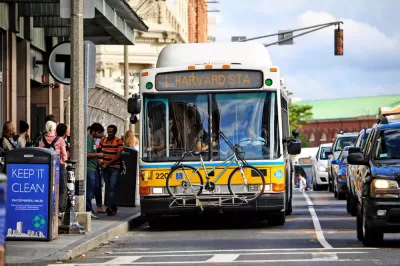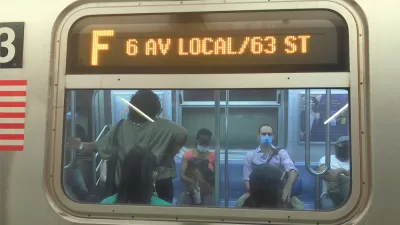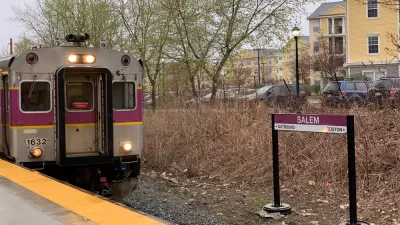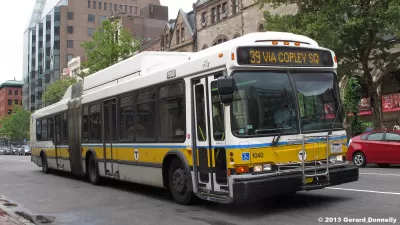The Massachusetts Bay Transportation Authority (MBTA) this week proposed cuts to public transit service. In a decision that will likely repeat as more transit agencies undertake similar processes, the MBTA decided to prioritize buses over trains.

The Massachusetts Bay Transportation Authority (MBTA) announced this week proposed service cuts to weekend commuter rail, 25 bus routes, all the ferry services in the system, and late-night subway service as the fiscal impact of the pandemic and declining fare revenues continue to take a toll on the transit system in the Boston region.
Steve LeBlanc breaks the news of the proposed cuts for the Associated Press, noting that ridership on all MBTA services is down to 330,000 average work day trips—down from 1.26 million average daily trips before the pandemic. The MBTA has yet to reduce service, but officials say the status quo can't last.
A separate article by Nik DeCosta-Klipa provides additional coverage of the MBTA's proposed service cuts, noted the huge number of uncertainties facing public transit, eight months into the pandemic in the United States: "How long will the COVID-19 pandemic endure? When will ridership return to its pre-coronavirus levels? Will ridership return to its pre-coronavirus levels?"
The answer MBTA planners have arrived on in producing the proposed service cuts: service with the lowest number of riders, as proven by persistent ridership during the pandemic, will see the deepest cuts.
Another article on the subject by Dan Zukowski picks up on the consequences of that decision: post-pandemic transit planning is likely to place priority on buses instead of commuter rail lines.
"As transit agencies plot their recovery from the devastating effects of the 2020 pandemic, a common denominator is emerging: more riders need city buses than suburban trains," writes Zukowski.
The story is the same in metro area after metro area, according to Zukowski: buses are carrying a far larger share of pre-Covid ridership levels (41 percent in Boston, 50 percent in New York, and 50 percent in Los Angeles) than commuter rail lines (12 percent in Boston, 16 percent in New York, and 10 percent in Los Angeles).
These ridership trends are likely to linger well into the future, according to Zukowski, as companies shift toward work from home arrangements even after the pandemic is over. The MBTA could just be the first in a wave of diminishing planning and funding priority for commuter rail.
"Planners are categorizing each subway, light rail, commuter and bus line along a four-axis grid that will determine the shape of Boston’s future transit system," according to Zukowski. "Most routes with high ridership serving transit-dependent customers will maintain existing service, and some may see increased service. Routes on the other end of the spectrum — with low ridership and less rider dependency on transit — are most likely to lose service. For other lines, the budget available to keep them running will determine future service levels." (DeCosta-Klipa provided a similar description of the evaluation process leading to the MBTA's service reduction proposal.)
Kat Benesh, chief of operations strategy, policy, and oversight for the MBTA, is quoted Zukowski's article saying that service changes made as a result of this process will be permanent.
FULL STORY: Transit agencies rethink future of commuter rail

Planetizen Federal Action Tracker
A weekly monitor of how Trump’s orders and actions are impacting planners and planning in America.

San Francisco's School District Spent $105M To Build Affordable Housing for Teachers — And That's Just the Beginning
SFUSD joins a growing list of school districts using their land holdings to address housing affordability challenges faced by their own employees.

The Tiny, Adorable $7,000 Car Turning Japan Onto EVs
The single seat Mibot charges from a regular plug as quickly as an iPad, and is about half the price of an average EV.

Seattle's Plan for Adopting Driverless Cars
Equity, safety, accessibility and affordability are front of mind as the city prepares for robotaxis and other autonomous vehicles.

As Trump Phases Out FEMA, Is It Time to Flee the Floodplains?
With less federal funding available for disaster relief efforts, the need to relocate at-risk communities is more urgent than ever.

With Protected Lanes, 460% More People Commute by Bike
For those needing more ammo, more data proving what we already knew is here.
Urban Design for Planners 1: Software Tools
This six-course series explores essential urban design concepts using open source software and equips planners with the tools they need to participate fully in the urban design process.
Planning for Universal Design
Learn the tools for implementing Universal Design in planning regulations.
Smith Gee Studio
City of Charlotte
City of Camden Redevelopment Agency
City of Astoria
Transportation Research & Education Center (TREC) at Portland State University
US High Speed Rail Association
City of Camden Redevelopment Agency
Municipality of Princeton (NJ)





























